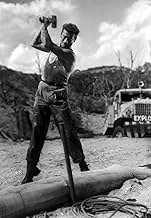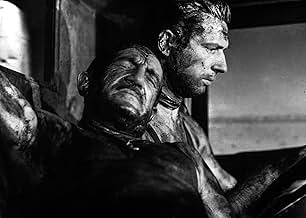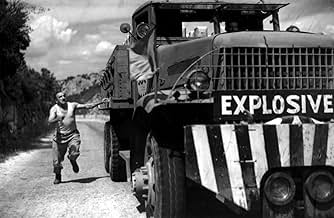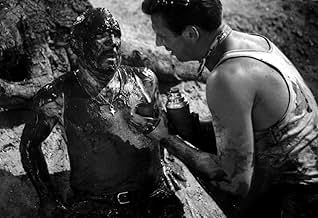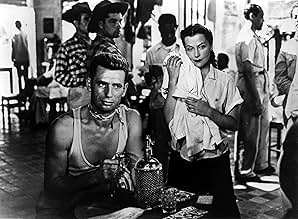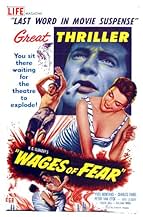En un ruinoso pueblo de América del Sur, contratan a cuatro hombres para el transporte urgente de un cargamento de nitroglicerina sin las condiciones necesarias de seguridad.En un ruinoso pueblo de América del Sur, contratan a cuatro hombres para el transporte urgente de un cargamento de nitroglicerina sin las condiciones necesarias de seguridad.En un ruinoso pueblo de América del Sur, contratan a cuatro hombres para el transporte urgente de un cargamento de nitroglicerina sin las condiciones necesarias de seguridad.
- Dirección
- Guión
- Reparto principal
- Ganó 1 premio BAFTA
- 6 premios y 1 nominación en total
Peter van Eyck
- Bimba
- (as Peter Van Eyck)
Véra Clouzot
- Linda
- (as Vera Clouzot)
Darío Moreno
- Pepito Hernandez
- (as Dario Moreno)
Antonio Centa
- Camp Chief
- (as Centa)
Charles Fawcett
- Bradley
- (sin acreditar)
Resumen
Reviewers say 'The Wages of Fear' is a gripping film about desperation and survival, with intense suspense and masterful direction by Henri-Georges Clouzot. Critics praise Yves Montand and Charles Vanel's performances and the exploration of human resilience. Some find the initial setup slow and criticize the portrayal of the American oil company. Despite this, the film is celebrated for its innovative cinematography and thematic depth.
Reseñas destacadas
Clouzot rarely gets the attention he deserves. He made not one, but two of the greatest thrillers of all time, 'Les Diaboliques' and 'The Wages Of Fear', both perfect examples of how to make genuinely suspenseful movies that build up an amazing amount of tension. Most so-called thrillers made in Hollywood these days are thrillers in name only and could learn a lesson or two from these movie classics. 'The Wages Of Fear' could even be described as an action movie, but it is a CHARACTER DRIVEN action movie, and that's what makes it so special. Modern audiences with MTV attention spans might find the plot a little slow, but I think the first half of the movie, which deals with the motley collection of exiles in a poor Latin American town, is not only fascinating in itself, but really makes a massive impact on the second half. By taking his time introducing the characters and exploring their relationships and possible motivations, Clouzet adds depth and meaning to the rest of the exciting story, something very rarely achieved in this type of movie since. The cast, every single one of them, are flawless. The four leads, Mario, the fairly decent guy played by yves Montand, his new best friend the shifty M. Jo (Charles Vanel), his old pal the kind hearted Luigi (Folco Lulli), and the enigmatic Bimba (Peter van Eyck), are all brilliant. Great performances, taut and imaginative direction, crisp and impressive cinematography, and a handful of the most riveting sequences ever committed to film make 'Wages Of Fear' a truly unforgettable experience. Suspense movies don't come much better than this! Simply a masterpiece.
My title is not an exaggeration. If you thought OJ Simpson's slow speed chase was insane, you need to change the batteries in your pacemaker and check out "Wages of Fear". This 1953 French classic tells the story of a bunch of guys who are stuck in a squalid South American village--a sort of Casablaca-esque purgatory--and will do anything to get out, even if it means getting themselves blown sky high. Slow and lazy for the first half (deliberately), the plot eventually reveals itself to be about a suicide mission to haul a zillion gallons of nitroglycerine across 300 miles of harsh terrain that would make the Coyote & Roadrunner take an early retirement.
Yes, nitro is that stuff that you don't want to look at the wrong way or it may send you to the moon. "Wages of Fear" ultimately reveals itself to be a gripping character study of how people keep their wits, or come unravelled, when subjected to pure terror... with of course the reward of heaven dangling just out of reach. So again we see this subtle allegory of purgatory, hell and heaven which I'm sure was the intent of director Henri-Georges Clouzot.
An interesting point of historical note is that when this film was released in the USA, around 15 minutes of its 150 min running time were cut. According to the Criterion mini-documentary "Censored", these cuts were largely due to the "anti-American" themes (the tyrannical oil corporation that exploits the lives of locals for the sake of a buck) as well as subtle themes of spiritual cynicism (the beautifully poetic "fence" monologue which symbolizes the absence of God/afterlife). By today's standards these censored scenes are prime time tv, but back in the 50s this movie was feared by US censors as being godless pinko propaganda. That might put a smirk on your face as you're watching this flick. But definitely look for the full 150ish minute version of this film, not the 130 min censored cut.
But really, for the entire second half there will be no smirking, only tense gritting of teeth as you watch these rolling nuke trucks inch across the South American jungle. The hazards they encounter, as well as their ingenious attempts to survive them, are extremely creative and expertly filmed with the sort of suspense that would make Hitchcock lose his breath.
Content advisory stuff: There's a scene in the beginning where a fine tarantula specimen gets squashed. After rewinding and rewatching the scene in slo-mo a dozen times, I'm almost certain that our unfortunate arachnid was a fake prop. If anyone knows differently please mention it in a review. The same scene shows a naked woman from behind, at a distance. Later in the film is a scene that shows a topless native woman from a distance--it's very artistic. Language is tame throughout the movie with maybe 1 or 2 instances of "merde" (the sh- word). While there is violence, none of it is shown explicitly on camera (some of it is disturbing, though). And unless you're a 1950s American censorship bureaucrat, there's nothing politically incendiary other than the notion that the almighty dollar is the root of much misery.
"Wages of Fear" is a well crafted, poetic, suspenseful film that certainly deserves its classic status in the history of cinema. Not unlike the classic Bogart/Lupino film "They Drive by Night" (1940), this film proves that a seemingly simple story about a bunch of truck drivers can really get your gears going.
Yes, nitro is that stuff that you don't want to look at the wrong way or it may send you to the moon. "Wages of Fear" ultimately reveals itself to be a gripping character study of how people keep their wits, or come unravelled, when subjected to pure terror... with of course the reward of heaven dangling just out of reach. So again we see this subtle allegory of purgatory, hell and heaven which I'm sure was the intent of director Henri-Georges Clouzot.
An interesting point of historical note is that when this film was released in the USA, around 15 minutes of its 150 min running time were cut. According to the Criterion mini-documentary "Censored", these cuts were largely due to the "anti-American" themes (the tyrannical oil corporation that exploits the lives of locals for the sake of a buck) as well as subtle themes of spiritual cynicism (the beautifully poetic "fence" monologue which symbolizes the absence of God/afterlife). By today's standards these censored scenes are prime time tv, but back in the 50s this movie was feared by US censors as being godless pinko propaganda. That might put a smirk on your face as you're watching this flick. But definitely look for the full 150ish minute version of this film, not the 130 min censored cut.
But really, for the entire second half there will be no smirking, only tense gritting of teeth as you watch these rolling nuke trucks inch across the South American jungle. The hazards they encounter, as well as their ingenious attempts to survive them, are extremely creative and expertly filmed with the sort of suspense that would make Hitchcock lose his breath.
Content advisory stuff: There's a scene in the beginning where a fine tarantula specimen gets squashed. After rewinding and rewatching the scene in slo-mo a dozen times, I'm almost certain that our unfortunate arachnid was a fake prop. If anyone knows differently please mention it in a review. The same scene shows a naked woman from behind, at a distance. Later in the film is a scene that shows a topless native woman from a distance--it's very artistic. Language is tame throughout the movie with maybe 1 or 2 instances of "merde" (the sh- word). While there is violence, none of it is shown explicitly on camera (some of it is disturbing, though). And unless you're a 1950s American censorship bureaucrat, there's nothing politically incendiary other than the notion that the almighty dollar is the root of much misery.
"Wages of Fear" is a well crafted, poetic, suspenseful film that certainly deserves its classic status in the history of cinema. Not unlike the classic Bogart/Lupino film "They Drive by Night" (1940), this film proves that a seemingly simple story about a bunch of truck drivers can really get your gears going.
In The Wages of Fear, four men in a remote South American town have the enviable task of transporting a metric buttload (technical term) of nitroglycerin across mountainous roads in poor condition. It's a taut, superbly suspenseful thriller, guided with a steady hand by director Henri-Georges Clouzot, who would go on to direct the classic Diabolique in 1955.
Yves Montand, in a rare dramatic role, plays Mario, the ostensible protagonist of our tale. He's been stuck in this backwater for some time, but it costs a lot of money to get out – plane fares are through the roof, and there's no train, and there's no neighboring village. In short, you're stuck there until you can buy a ticket – and pay for a passport, of course.
Mario spends his days looking for work, wooing tavern worker Linda, and despairing about the lack of work. There's an American oil company in town, but they're no longer hiring. His monotonous lifestyle is interrupted by the arrival of fellow expat Jo (Charles Vanel), a tough-looking older man who quickly wins Mario's favor at the expense of the rest of the men in town.
The oil company, in fact, has its own problem – one of their large derricks has exploded, causing a huge oil fire. Company man Bill O'Brien decides to send two trucks loaded with nitro from the town up the mountain to the derrick. (The eventual idea is to set off charges, which will somehow contain or extinguish the fire.) O'Brien has no trouble scaring up volunteers for the task, since the men of the town are largely unemployed. Four men will be selected to take the two trucks. Only one truck is needed; the second is truly just in case there's an accident with the first one. The men will receive $2000 when the work is finished, more than enough to secure passage out of the backwater.
Mario and Jo are chosen, as are Mario's roommate Luigi (Folco Lulli) and German expat Bimba (Peter van Eyck). The two trucks depart early in the morning, full of gas and of nitro. Danger awaits.
Theirs is not an easy task. The road is full of ruts. In one place, the wooden deck that trucks use to make a sharp turn up the mountain has been damaged from disuse. It's hot and muggy. And one has to be very, very careful, as even the smallest bump might set the whole shebang off. There's also tension among the four drivers – Luigi is unhappy that Mario is spending more time with Jo than with him, Mario is unhappy with what he perceives as Jo's cowardice. Bimba seems to get along with everyone, though.
The whole time I was watching this movie, I was certain not all four were going to make it. I will not spoil what is now a sixty-three-year-old movie, but I was still genuinely surprised by the ending. This ain't no fairy tale or sitcom. This is a movie about desperation, redemption, sacrifice, and comeuppance. It's not necessarily about justice.
The Wages of Fear is a singularly terrific movie from start to finish, exquisitely shot and expertly written. Its money maker is its tension, something present here in spades. The writing is impeccable; even personality changes make perfect sense within the film's context. There are intricacies within a straightforward plot. This is a must see for lovers of thrillers.
Yves Montand, in a rare dramatic role, plays Mario, the ostensible protagonist of our tale. He's been stuck in this backwater for some time, but it costs a lot of money to get out – plane fares are through the roof, and there's no train, and there's no neighboring village. In short, you're stuck there until you can buy a ticket – and pay for a passport, of course.
Mario spends his days looking for work, wooing tavern worker Linda, and despairing about the lack of work. There's an American oil company in town, but they're no longer hiring. His monotonous lifestyle is interrupted by the arrival of fellow expat Jo (Charles Vanel), a tough-looking older man who quickly wins Mario's favor at the expense of the rest of the men in town.
The oil company, in fact, has its own problem – one of their large derricks has exploded, causing a huge oil fire. Company man Bill O'Brien decides to send two trucks loaded with nitro from the town up the mountain to the derrick. (The eventual idea is to set off charges, which will somehow contain or extinguish the fire.) O'Brien has no trouble scaring up volunteers for the task, since the men of the town are largely unemployed. Four men will be selected to take the two trucks. Only one truck is needed; the second is truly just in case there's an accident with the first one. The men will receive $2000 when the work is finished, more than enough to secure passage out of the backwater.
Mario and Jo are chosen, as are Mario's roommate Luigi (Folco Lulli) and German expat Bimba (Peter van Eyck). The two trucks depart early in the morning, full of gas and of nitro. Danger awaits.
Theirs is not an easy task. The road is full of ruts. In one place, the wooden deck that trucks use to make a sharp turn up the mountain has been damaged from disuse. It's hot and muggy. And one has to be very, very careful, as even the smallest bump might set the whole shebang off. There's also tension among the four drivers – Luigi is unhappy that Mario is spending more time with Jo than with him, Mario is unhappy with what he perceives as Jo's cowardice. Bimba seems to get along with everyone, though.
The whole time I was watching this movie, I was certain not all four were going to make it. I will not spoil what is now a sixty-three-year-old movie, but I was still genuinely surprised by the ending. This ain't no fairy tale or sitcom. This is a movie about desperation, redemption, sacrifice, and comeuppance. It's not necessarily about justice.
The Wages of Fear is a singularly terrific movie from start to finish, exquisitely shot and expertly written. Its money maker is its tension, something present here in spades. The writing is impeccable; even personality changes make perfect sense within the film's context. There are intricacies within a straightforward plot. This is a must see for lovers of thrillers.
Whoever it may be to rightly claim that he invented the action thriller genre (Méliès, I suppose), Henri-Georges Clouzot's "Le salaire de la peur" is an indispensable milestone on the exciting route to the best films of that kind in the 70's, 80's and nowadays. In its tenseness, as symbolized by the danger of explosion of the lorries' loads, it has hardly been surpassed.
The plot is perfectly worked out from start to end, the leading players act in some of their best parts ever, the (almost) absence of music supports the brutal realism and the consequent choice of authentic outdoor settings contributed a lot to the film's deserved success. Historically, it ranges between neorealismo and nouvelle vague, and yet it is its pure action and suspense that make it worth watching for younger audiences who wouldn't go in for just the artistic way. - Only flaw I can see is the curious, rather artificial change in Vanel's character which has no comprehensible motivation, at least for me whenever I see it.
Apart from that, Clouzot's wife Véra (also well-known from his "Les diaboliques") plays to the "most breathtaking angles" gallery when she bows down to scrub the floor of Dario Moreno's gin joint. It's a man's world after all and there are male perspectives on human survival only. Well, it's existentialism, mates. Altogether, the black and white photography is gripping. The gun scene between Lulli and Vanel is one of the best montages in film history, and there is more excellent editing in "Salaire" (including the finale) that completely fits the hot atmosphere.
The plot is perfectly worked out from start to end, the leading players act in some of their best parts ever, the (almost) absence of music supports the brutal realism and the consequent choice of authentic outdoor settings contributed a lot to the film's deserved success. Historically, it ranges between neorealismo and nouvelle vague, and yet it is its pure action and suspense that make it worth watching for younger audiences who wouldn't go in for just the artistic way. - Only flaw I can see is the curious, rather artificial change in Vanel's character which has no comprehensible motivation, at least for me whenever I see it.
Apart from that, Clouzot's wife Véra (also well-known from his "Les diaboliques") plays to the "most breathtaking angles" gallery when she bows down to scrub the floor of Dario Moreno's gin joint. It's a man's world after all and there are male perspectives on human survival only. Well, it's existentialism, mates. Altogether, the black and white photography is gripping. The gun scene between Lulli and Vanel is one of the best montages in film history, and there is more excellent editing in "Salaire" (including the finale) that completely fits the hot atmosphere.
10barleeku
This movie is astonishing, a gritty story filmed in an ultra-real style that relies simply on the beauty of lighting and film to achieve its stunning effects. It seems from another world, which in a way, it is. The acting is superb: Montand's Mario is full of jerky movements and intense impulses but always maintains his Gallic savoir-faire, while Charles Vanel as Jo brings, at first at least, a type of macho to the screen that modern movie-makers simply do not comprehend. The rest of the cast, especially the camp chief, Luigi, and Peter van Eyck as Bimba are incredible, as is Vera Clouzot who is incomprehensibly but believably upbeat and innocent - and totally gorgeous - in the midst of the hellhole of a town they're all stuck in. Clouzot's directing is flawless - I don't think anyone has ever squeezed more tension with just a few essential scene elements. The trucks wheeze and grunt as well as they ever have in the movies - the only comparison is Spielberg's early gem, "The Duel", but Clouzot's automotive cinematics outdo even Spielberg. The stripped down existentialism of the characters, the starkness of their shared dilemma, the grim and grimy scenery, and the cinematography itself are all of a piece. The latter is what elevates this movie to the very top rank, including some of the most dramatic and effective black and white shooting I've ever seen. Yet it never becomes mannered or gratuitous - it is orchestrated with the rise - and rise! - of tension in the film. The final scene takes on a surreal as opposed to ultra-realistic quality that has its own logic. One last word about the acting - we don't see anything like it anymore. The self-conscious mannerism of method acting (which has had its own triumphs) and the toxic awareness of everyone from the actors to the audience, the camera, directors, etc. that each actor is a celebrity and potential artiste, has ruined that conviction that actors were once larger than life people before they went on-screen, that they came to acting as an outcome of living rough, unadorned, and yet imaginative lives as opposed to shooting for fame and fortune and celebrity within an artificial corporate star-making incubator.
¿Sabías que...?
- CuriosidadesYves Montand and Charles Vanel both suffered from conjunctivitis after filming in a pool of crude oil and being exposed to gas fumes.
- PifiasWhen Bimba is shaving in the cab of the truck, he has the right side of his face covered in shaving cream, but when he turns to talk to Luigi the right side of his face is clear of shaving cream.
- Versiones alternativasThe film was cut for U.S. distribution in 1954, in part due to scenes that denounced crooked U.S. business interests in Latin America. The Criterion Collection laserdisc restored the film to its uncut version with 21 minutes of footage removed from other versions of the film.
- ConexionesFeatured in Montand à la rencontre de Pagnol (1986)
- Banda sonoraThe Blue Danube
Composed by Johann Strauss
Selecciones populares
Inicia sesión para calificar y añadir a tu lista para recibir recomendaciones personalizadas
Detalles
- Fecha de lanzamiento
- Países de origen
- Idiomas
- Títulos en diferentes países
- El salari de la por
- Localizaciones del rodaje
- Empresas productoras
- Ver más compañías en los créditos en IMDbPro
Taquilla
- Recaudación en Estados Unidos y Canadá
- 21.228 US$
- Fin de semana de estreno en EE. UU. y Canadá
- 7633 US$
- 1 dic 2024
- Recaudación en todo el mundo
- 22.326 US$
- Duración
- 2h 36min(156 min)
- Color
- Relación de aspecto
- 1.37 : 1
Contribuir a esta página
Sugerir un cambio o añadir el contenido que falta

![Ver Trailer [English SUB]](https://m.media-amazon.com/images/M/MV5BNWU5Zjk4MDAtZDM1Ni00YzJmLTkyZTUtYjVhN2VjNzZmOGVhXkEyXkFqcGdeQXRyYW5zY29kZS13b3JrZmxvdw@@._V1_QL75_UX500_CR0)
